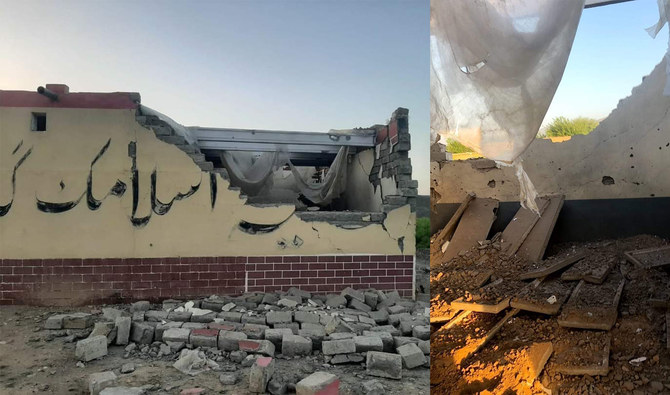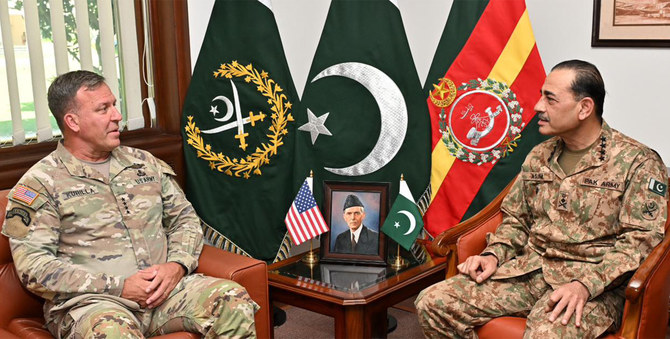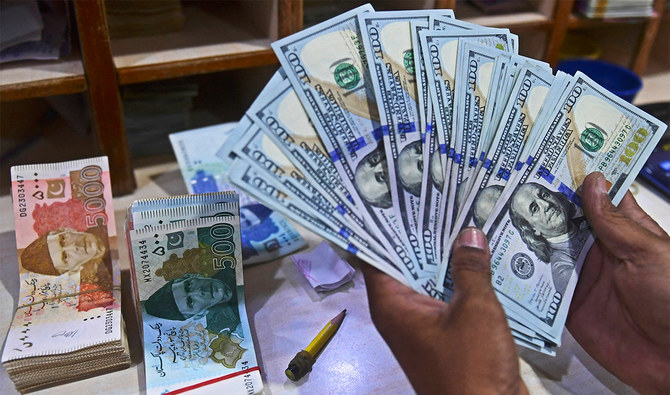ISLAMABAD: Hundreds of desperate Pakistanis overwhelmed a government-run coronavirus vaccination center in the capital Monday as the nation grapples with a shortage of life-saving shots even as a decline in new infections has seen some restrictions eased.
Most of those clamouring to be vaccinated were Pakistanis who work overseas — mainly in the Gulf Arab nations such as Saudi Arabia — who need a shot of the hard-to-find AstraZeneca vaccine to travel there.
“We have a very limited capacity here, but for the past few days the center has been overwhelmed by those wanting to travel abroad,” senior police official Farooq Amjad Buttar told AFP.
Pakistan has so far fully or partially vaccinated nearly 12 million people from a population of 220 million, and mostly with the Chinese Sinopharm or Sinovac jabs.
Most Gulf nations, however, require incoming foreign workers to be vaccinated with the AstraZeneca or Pfizer brands, which are in short supply in Pakistan.
Millions of Pakistanis work abroad, and their remittances are a key part of Pakistan’s economy and its foreign currency reserves.
On Monday, a crowd of hundreds overwhelmed staff at a vaccination center, smashing glass doors as they pressed to get in.
“It was not a protest or an attack,” Buttar said, downplaying the incident in which no one was injured.
Muhammad Shehzad, traveled from the northwestern city of Mardan to Islamabad in the hope of getting an AstraZeneca shot.
“Saudi officials say they will let us enter only after getting vaccinated,” he said
“Before I got a Chinese vaccine, but they are saying they will accept American vaccines only,” Shehzad added.
Earlier this month Pakistan received 1.2 million doses of AstraZeneca under the COVAX facility.
So far, the impoverished South Asian nation has dodged the worst of Covid-19, but officials have warned a fourth wave could hit the country next month.
Deaths and new infections have come down, however, and social gathering restrictions have recently been eased, business hours extended and some school reopened.
Desperate Pakistanis working overseas in Gulf nations overrun COVID-19 vaccine center in Islamabad
https://arab.news/6g23j
Desperate Pakistanis working overseas in Gulf nations overrun COVID-19 vaccine center in Islamabad

- Most Gulf nations require incoming foreign workers to be vaccinated with AstraZeneca or Pfizer which are in short supply in Pakistan
- On Monday, a crowd of hundreds overwhelmed staff at a vaccination center, smashing glass doors as they pressed to get in
Saudi tech company partners with Pakistan’s ABHI to launch financial services in Kingdom

- ABHI, which also serves customers in UAE, was selected as one of Gulf country’s Future 100 companies last year
- Saudi tech company says partnership to empower Kingdom’s citizens, embolden private sector and foster economic growth
KARACHI: Alraedah Digital Solutions, a leading Saudi technology company, announced on Thursday it was entering into a strategic partnership with Pakistani fintech ABHI to launch “innovative” financial services in the Kingdom.
Alraedah Digital Solutions, the digital arm of Alraedah Digital Group, focuses on innovation and digital transformation to empower businesses and individuals through cutting-edge solutions in finance and technology.
ABHI is a Pakistani fintech company that provides innovative finance solutions to businesses and their employees. Last year, it was selected as one of the Future 100 companies of the United Arab Emirates.
Founded in 2021, ABHI has been serving customers in Pakistan, UAE, and Bangladesh through its credit-bridging products. These include Earned Wage Access, Invoice Factoring, SME Working Capital & Revenue Based Financing, and Payroll Solutions.
“Under the terms of the agreement, Alraedah will leverage ABHI’s robust capabilities to launch a set of innovative financial services in KSA,” the Saudi company said in a press release.
The statement said as per the terms of the agreement, ABHI will gain access to Alraedah’s knowledge and understanding of the local Saudi market. This would enable it to collaboratively launch innovative financing products in Saudi Arabia.
“Alraedah will enable access to $200 million over the course of three years to develop products that apply ABHI’s proprietary technology, localized for the Saudi market,” the press release said.
The Pakistani fintech says it has a client base of over 1,000 esteemed companies and actively promotes financial empowerment and provides stability to over 750,000 employees across the region.
“With our innovative financial solutions and Alraedah’s deep local expertise, we are poised to empower Saudi citizens, embolden the private sector, and foster a more vibrant, thriving economy,” Omair Ansari, co-founder and CEO of ABHI, was quoted as saying.
Paul Melotto, CEO of Alraedah Digital Solutions, said both companies aim to redefine access to financial services and empower individuals and businesses across the region.
“Together, we aim to redefine access to financial services and empower individuals and businesses across the region,” he said.
Suspected militants bomb school for girls in northwestern Pakistan

- No one harmed as militants blow up girls school in North Waziristan district, say police
- Pakistan witnessed attacks on girls’ schools until 2019 by militants opposed to female education
DERA ISMAIL KHAN, Pakistan: Militants detonated a bomb at a girls school in a former stronghold of the Pakistani Taliban in the country’s volatile northwest, badly damaging the structure, police said Thursday. No one was harmed in the overnight attack.
There was no immediate claim of responsibility for the attack late Wednesday that targeted the only girls school in Shawa, a town in the North Waziristan district in the Khyber Pakhtunkhwa province bordering Afghanistan, local police chief Amjad Wazir said.
UNICEF condemned the bombing as “despicable and cowardly act that could jeopardize the future of many young and talented girls.”
According to the police chief, the attackers first beat up the school guard before setting off the explosives at the private Aafia Islamic Girls Model School, which has 150 students.
Suspicion is likely to fall on Islamic militants and specifically the Pakistani Taliban, who have targeted girls schools in the province in the past, saying that women should not be educated.
In a statement, Abdullah Fadil, the UNICEF representative in Pakistan, said the “destruction of a girls’ school in a remote and underserved area is a heinous crime detrimental to national progress.” He cited Prime Minister Shehbaz Sharif statement on Wednesday declaring an education emergency and pledging to work toward enrolling 26 million out-of-school children.
Pakistan witnessed multiple attacks on girls schools until 2019, especially in the Swat Valley and elsewhere in the northwest where the Pakistani Taliban long controlled the former tribal regions. In 2012, the insurgents attacked Malala Yousafzai, a teenage student and advocate for the education of girls who went on to win the Nobel Peace Prize.
The Pakistani Taliban, known as Tehreek-e-Taliban Pakistan or TTP, were evicted from Swat and other regions in recent years. The TTP are a separate group but a close ally of the Afghan Taliban, who seized power in Afghanistan in 2021.
The Taliban takeover in neighboring Afghanistan has emboldened the Pakistani Taliban.
US CENTCOM commander, Pakistan Army chief discuss joint training, regional security

- US CENTCOM directs and enables military operations with allies and partners to increase regional security
- CENTCOM commander appreciated Pakistan Army’s contribution in war against “terrorism,” says army
ISLAMABAD: Pakistan’s Army Chief General Syed Asim Munir and General Michael Erik Kurilla, the commander of the US Central Command (CENTCOM) discussed regional security and joint training in a meeting on Thursday, the army’s media wing said.
US CENTCOM directs and enables military operations with its allies to increase regional security and promote US interests. Among its stated command priorities is to counter violent extremist organizations.
Pakistan has seen a surge in militant attacks in its Balochistan and Khyber Pakhtunkhwa (KP) provinces bordering Afghanistan since a fragile truce between the state and the Pakistani Taliban broke down in Nov. 2022.
Both Pakistan and US have collaborated over the years to take out militant organizations, especially in Pakistan’s restive tribal areas bordering Afghanistan.
Pakistan Army’s Inter-Services Public Relations (ISPR) said General Kurilla called on Munir at the army’s headquarters in Rawalpindi.
“During the meeting, matters of shared interests, particularly cooperation in regional security matters came under discussion,” the ISPR said.
“Both sides discussed avenues of joint training and reiterated the need for enhancing training interactions between CENTCOM and Pakistan Army.”
The ISPR said Kurilla acknowledged Pakistan Army’s success in its fight against “terrorism” and appreciated its continued efforts to bring peace and stability to the region.
Ties between Islamabad and Washington, once close allies, have just started to warm after some years of frosty relations, mostly due to concerns about Pakistan’s alleged support of the Taliban in Afghanistan. Pakistan denies this support.
Relations strained further under the government of former prime minister Imran Khan, who ruled from 2018-22 and antagonized Washington throughout his tenure, welcoming the Taliban takeover of Afghanistan in 2021 and later accusing Washington of being behind attempts to oust him. Washington has dismissed the accusation.
The government of PM Shehbaz Sharif that took over after Khan and whose term ended last year tried to mend ties but analysts widely believe the United States will not seek a significant broadening of ties with Islamabad in the near future but remain mostly focused on security cooperation, especially on counterterrorism and Afghanistan.
Pakistan’s foreign reserves with central bank surge past $9 billion after IMF inflows

- Pakistan last month received $1.1 billion from IMF as final tranche of its $3 billion loan program
- Talks between IMF and Pakistan for a fresh loan program is expected to be held this month
KARACHI: Pakistan’s foreign exchange reserves with its central bank surged to $9.12 billion on Thursday, data from the State Bank of Pakistan (SBP) after Islamabad received the final tranche of $1.1 billion from the International Monetary Fund (IMF) last month.
The SBP confirmed on April 30 that Pakistan had received the final tranche of $1.1 billion as part of a $3 billion IMF loan program it entered last summer.
The South Asian country is expected to hold discussions this month with an IMF mission for a “larger and longer” program that Islamabad hopes would help avert its macroeconomic crisis.
“Foreign reserves held by the State Bank of Pakistan total $ 9,120.3 million,” the SBP said in a statement. It added that total reserves held by the country stood at $ 14,458.9 million, out of which net foreign reserves worth $ 5,338.6 million were by commercial banks.
Pakistan has been struggling with a chronic economic crisis since April 2022 that has seen its foreign exchange reserves plummet to historic lows and its national currency depreciate significantly against the US dollar.
The South Asian country has turned to international financial institutions and multilateral partners to secure external financing in a bid to stave off a balance of payment crisis.
Desperate to shore its foreign reserves, Pakistan has recently welcomed visits by business delegations and diplomats from Saudi Arabia, Japan, Qatar and Azerbaijan to attract investment.
Last year Pakistan set up the Special Investment Facilitation Council, a body consisting of Pakistani civilian and military leaders and specially tasked to promote investment in Pakistan. The council is so far focusing on investments in the energy, agriculture, mining, information technology and aviation sectors and specifically targeting Gulf nations.
Pakistan fast bowler Amir to miss first T20I against Ireland after visa delay

- Mohammad Amir gets travel visa, expected to join squad from Friday, confirms PCB
- Pakistan will play three T20Is against Ireland and four against England this month
ISLAMABAD: Left-arm fast bowler Mohammad Amir has received his travel visa but won’t make it in time to play the first T20I match against Ireland on Friday, the Pakistan Cricket Board (PCB) has confirmed.
Amir did not travel to Ireland with Pakistan’s squad this week due to visa delay issues. Pakistan will play a three-match T20I series against the Irish side from May 10-14 in Dublin before departing for the UK where they will play against England in a four-match T20I series.
“Fast bowler Mohammad Amir will miss the first T20I due to delays in the issuance of his visa,” the PCB said in a statement on Thursday. “He is expected to join the side on Friday.”
Amir, 32, came out of international retirement last month for the home series against New Zealand, drawn 2-2. The pacer is eyeing a spot in the 15-man squad for next month’s T20 World Cup in the Caribbean and the United States.
The three-match series in Dublin is also World Cup preparation as both teams are in the same group alongside India, US and Canada.
Amir will bolster Pakistan’s pace battery which comprises the likes of Naseem Shah, Shaheen Shah Afridi, and Haris Rauf.
Squads:
Ireland: Paul Stirling (captain), Mark Adair, Ross Adair, Andrew Balbirnie, Curtis Campher, Gareth Delany, George Dockrell, Graham Hume, Barry McCarthy, Neil Rock, Harry Tector, Lorcan Tucker, Ben White, Craig Young
Pakistan: Babar Azam (captain), Abrar Ahmed, Azam Khan, Fakhar Zaman, Haris Rauf, Hasan Ali, Iftikhar Ahmed, Imad Wasim, Mohammad Abbas Afridi, Mohammad Amir (unavailable for first T20I), Mohammad Rizwan, Muhammad Irfan Khan, Naseem Shah, Saim Ayub, Salman Ali Agha, Shadab Khan, Shaheen Shah Afridi and Usman Khan.









